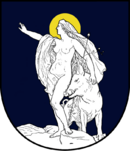Politics of Eemsmerschen
This article is incomplete because it is pending further input from participants, or it is a work-in-progress by one author. Please comment on this article's talk page to share your input, comments and questions. Note: To contribute to this article, you may need to seek help from the author(s) of this page. |
Politics of Eemsmerschen | |
|---|---|
 Coat of Arms of Eemsmerschen | |
| Polity type | Representative democratic Confederal republic |
| Constitution | Constiution of Eemsmerschen |
| Legislative branch | |
| Name | Büernding |
| Type | Unicameral |
| Meeting place | Büerndingstee, Brüggedörp |
| Presiding officer | Brüne Vennemann, Gesettsnacker |
| Appointer | Electoral vote |
| Judicial branch | |
| Name | Judiciary of Eemsmerschen |
| Büerndingricht | |
| Seat | Büerndinghall, Brüggedörp |
The government of Eemsmerschen is a confederal state with representative democracy, however it lacks any executive function. The common government is the Büernding (Peasant's Thing), the governing assembly of Eemsmerschen, presided over by the Gesettsnacker (Lawspeaker). It provides both legislative and judiciary functions and is housed at the Büerndingdingstee and Büerndinghall respectively, both located in the political capital Brüggedörp.
- The legislative and main section of the Peasant's Thing (Büernding) serves a legislative function. Reviewing and amending the laws, it is made up of 72 Hovetlinge (Chiefs), that each have two Dingmannslüüd (lit. "Thing men") to advise and sit alongside them, and the Gesettsnacker (Lawspeaker), making up the 217 members of the Büernding. The Hovetlinge are elected by the landowners of 8 countries (Kreise) that elect 9 Hovetlinge each, thus making 72 of the members elected and 145 appointed by those elected themselves. For reasons of modern practicality, the Gesettsnacker was granted a ceremonial role something akin to a Head of Government as the first among equals in the late 1500's.
- The judiciary section is headed by the Peasant's Thing Court (Büerndingricht), whose 72 judges are appointed by the chiefs of the Legislative Council, each chief appointing one judge. While still part of and subject to the Büernding, it is semi-independant and serves as the highest court in Eemsmerschen, presiding over the Kreisgerichte (Regional courts). The judges of the regional courts themselves are appointed by their respective 9 Hovetlinge. Below the Kreisgerichte are the Dorfgerichts (Village courts), which vary in numbers, competency and size between the Kreise.
For any change in the constitution, a referendum within the Rechtsraat is mandatory; for any change in a law, a referendum can be requested. In addition, the people may present a constitutional popular initiative to introduce amendments to the federal constitution, subject to discussion and approval by the Rechtsraat.
The lack of any executive branch makes the political system of Eemsmerschen very unusual. As there is no executive, when the judicial comes to a verdict, the punishment or penalty must be enforced by the affected persons or their family. During times of war, the lack of an executive figure is dealt with by the 72 Hovetlinge electing a general to the temporary position of Böverbefehlshebber (Commander-in-Chief). Otherwise, the 9 Hovetlinge from each Kreis (county) elect a general for each of their respective counties. Each have their own term limits (or lack thereof) and other various differences.
Peasant's Thing
EXAMPLE
Political parties, organisations, and elections
EXAMPLE
Judicial branch
EXAMPLE
Administrative divisions
Main article: Subdivisions of Eemsmerschen
There are 8 Kreise in Eemsmerschen. Each Kreis has its own constitution, legislature, government, courts and self-managed subdivisions. 3 of the Kreise are themselves direct-democracies, while the rest are representative.
Political conditions
EXAMPLE
Foreign Relations
EXAMPLE

